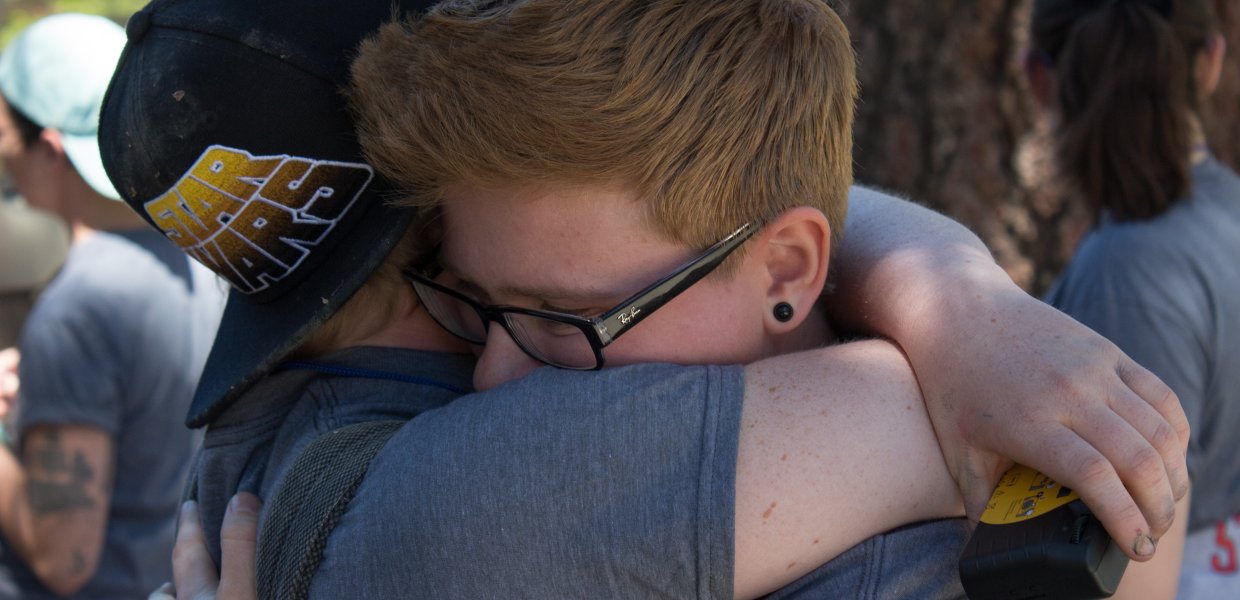For the past three years, young people from across the country have gathered in the mountains of southern California at Camp Brave Trails. In the summer 2015, the camp's first year, there were 46 campers. By 2017, the number had grown to 115.
Brave Trails offers all of the classic camp activities: swimming, hiking, sports, arts and crafts. But the camp's mission provides more than just a way to spend the summer and make new friends. Brave Trails is an LGBTQ youth leadership camp, open to youth between the ages of 12 and 20, offering workshops in leadership and personal development alongside more standard camp fare.
The Brave Trails website lists statistics from the Human Rights Campaign that provide a sobering context for the camp's creation: LGBTQ kids are more likely to attempt suicide, less likely to report happiness, more likely to experiment with drugs and alcohol, and more likely to be bullied. But a majority report that they "believe things will get better in the future," which is where Brave Trails steps in, providing a "safe and supportive environment" for campers to "thrive and create change."
Annenberg Communication doctoral candidate Traci Gillig has been involved with Brave Trails from its beginning and plans to draw from the data collected there for her dissertation. She first met the camp's founders, Jessica and Kayla Ryan Weissbuch, when she was volunteering at the Los Angeles LGBT Center. As she worked with them, she saw an opportunity to link their new camp with her own research.
"When I learned they were planning a camp, I thought it sounded like an incredible opportunity for youth. At some point I remember thinking, 'You know, a program evaluation might be helpful here'," Gillig recalled of the genesis of her work.
Gillig's research focuses broadly on health communication, specifically the social factors that influence youth health and well-being, so Brave Trails was a perfect fit. Her experience at Annenberg, collaborating with faculty like Sheila Murphy and Lynn Miller, and working with her dissertation chair, Larry Gross, gave her the foundation she needed to provide the camp with a comprehensive study. Her first article from her work with Brave Trails, co-authored with Miller and fellow Annenberg doctoral candidate Courtney Cox, "She Finally Smiles...For Real": Reducing Depression and Bolstering Resilience through an Identity-Affirming Program for LGBTQ Youth, has recently been accepted for publication by the Journal of Homosexuality.
Gillig surveyed two groups of young people and their parents, hoping to see what difference Brave Trails made in the lives of those who attended.
"We surveyed campers and a group of LGBTQ youth who weren't attending camp about their experiences and topics related to identity development, self-esteem, and well-being. We also reached out to campers' parents to better understand the effects of the program," said Gillig.
In 2017, Gillig used three "waves" of surveys, all online: one before camp, one on the last day of camp, and one three months after camp. The results showed campers who blossomed at Brave Trails. Gillig also served as a utility staff member at the camp and found herself truly able to put a face to the research she'd done.
"Even though I knew from our previous work that positive change was happening, how visible campers' growing confidence was during the course of the week surprised me," she said.
In her surveys of campers and parents, Gillig has been able to provide camp staff with answers to questions they may never have thought to ask and offer concrete examples of what's working and what's not. She sees similar potential for impact in some of her other work.
A recent paper she co-authored with Annenberg Professor Sheila Murphy, Erica L. Rosenthal, and Kate Langrall Folb, "More than a media moment: The influence of televised storylines on viewers' attitudes toward transgender people and policies," studied the effects on viewers of transgender characters on television. The study was widely reported on in the media, appearing in the Los Angeles Times, Newsweek, the San Francisco Chronicle, Pacific Standard, and more.
Just as Gillig's work with Brave Trails has enabled the camp's staff to make adjustments based on the feedback they received, studies like "More than a media moment" can encourage and enlighten writers, directors, and producers as they strive for more inclusion in their work.
"Creators can intuit the impact of their work, but sometimes messages and portrayals have unexpected outcomes, particularly in the context of complex social issues," Gillig explained.
She sees potential collaborations between scholars/researchers and film/television creatives as promising.
"There are real opportunities for productive collaboration that can have a broad influence on social issues," she said. "I'd be honored to collaborate with creators."
